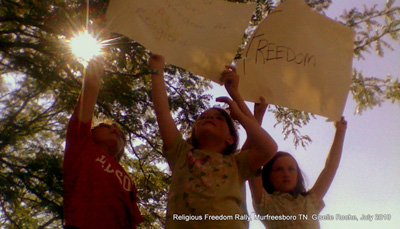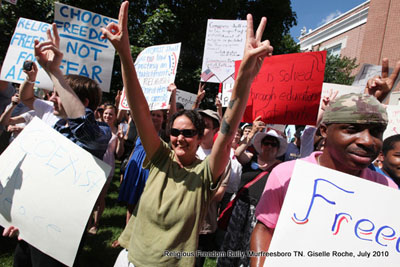|
Pulling up the Welcome Mat
by Amanda Cantrell Roche
“Those who cannot remember the past are condemned
to repeat it.”
- George Santayana |
The
rhetoric on immigration in middle Tennessee’s primary elections
was stunning. I found myself asking, “Do I really live in
a state in which these are viable candidates?” Just down
the road from Nashville, my home town of Murfreesboro was
making international news in June for the vehement opposition
to an Islamic Center there. Residents, fueled by the words
of candidates such as Lou Ann Zelenik, protested in mass
against what many claimed was a terrorist training camp.
Their reasoning: Well, aren’t all Muslims potential terrorists?
According to Zelenik, if the members of this religious community
will not openly denounce extremists who share their belief
in Islam, they must be counted, apparently along with the
approximately one and a half billion Muslims in this world,
among the Jihadists.
I wonder
what Zelenik, who is openly Christian, would say to someone
demanding she denounce abortion clinic murderers, or else
be labeled as a terrorist merely by shared religious association.
One
gubernatorial candidate, Ron Ramsey, even questioned if
Islam was a religion: “Now you could even argue whether
being a Muslim is actually a religion, or is it a nationality,
a way of life or cult,” he said while jaws dropped, and
some of us cringed at the thought of this figure being the
public face of Tennessee.
Thankfully,
neither of these candidates won in the primary, but the
number of people who voted for each was, disturbingly, in
the thousands.
Muslims
are but one target. Our Latino brothers and sisters, willing
to do hard labor for less money than most, bear the brunt
of anger and frustration of large numbers of un and underemployed
in a struggling economy. And politicians capitalized on
that vexation to vie for votes, adding antagonism, but little
understanding, to the situation.
Racial
profiling is an issue in Nashville as well. Yes, the color
of your skin is, amazingly, still a potential risk factor
for traffic stops in 2010. In June a racial profiling hearing
was held at Nashville’s Scarritt Bennett Center to review
accounts of immigrants and minorities willing to speak out,
while a week later Tennessee politicians traveled to Arizona
to learn how to implement tough, perhaps even unconstitutional,
immigration reform laws here.
In
this climate, it is no wonder that members of Nashville’s
Mexican, Kurdish, Egyptian, Sudanese, Burmese and Iranian
communities, along with many other international residents
we are fortunate to host, are often reluctant to speak out
when their rights are violated, when their homes are robbed,
their children threatened. They silently endure crimes because
they are more afraid of law enforcement than their perpetrators.
When one’s skin, religion, language and culture raise alarm
and distrust rather than welcome and engagement, it is best
to stay out of the way, to stay hidden, to keep as mute
as Anne Frank’s attic.
But
while a vocal minority fumes, there is progress. Nashville
for All of Us, a community coalition supported by Mayor
Karl Dean, helped defeat an “English Only” referendum in
January 2009 which would have required nearly all local
government communications to be conducted only in English.
And there were equally as many people at a Religious Freedom
Rally to support the Islamic Center as there were protesters.
It
is enough to offer at least a ray of hope; A hope that
we can embrace that we are a city, a nation of immigrants,
and will continue to be. A hope that education will crack
the wall of anger fueled by mistrust and ignorance, and
open a window of understanding and communication. A hope
for realization that to live in a safe place and have enough
to eat is the right of anyone, no matter what flag under
which one was born. A hope that we have witnessed enough
persecution because of skin color or homeland or religion
to step back and comprehend the absurdity of it all. A hope
that Santayana’s words still resonate, and we have learned
the harsh lessons of the Holocaust, of segregation, that
the scars are still etched on our collective skin, and this
time, the path towards justice and tolerance will not bear
the bloody stains of our turbulent past.
|
|


|
Disclaimer: These organizations are in no
way affiliated with Nashville Skyline, and the views
expressed in this essay do not necessarily represent
the views of these groups.
Scarritt Bennet Center: Diversity in Dialogue: Dialogues
on Immigration
www.scarrittbennett.org/programs/divdialogue.aspx
TIRRC: Tennessee Immigrate and Refugee Rights Coalition
www.tnimmigrant.org
Nashville for All of Us
www.nashvilleforallofus.org
|
|